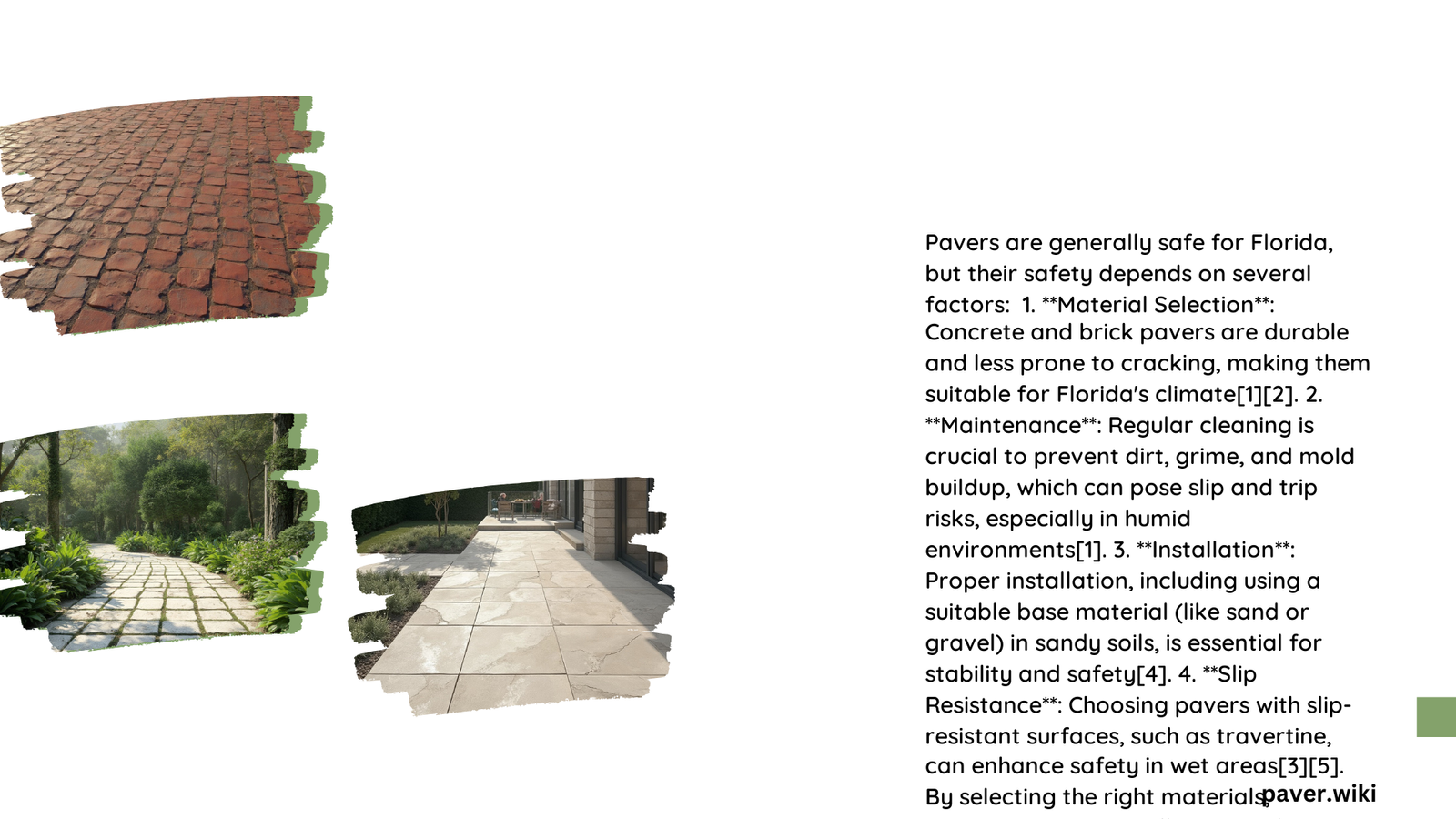Pavers are a popular choice for outdoor surfaces in Florida, known for their durability and aesthetic appeal. However, given Florida’s unique climate and environmental conditions, it’s crucial to understand the safety aspects of using pavers in this state. This guide explores the safety, durability, and maintenance of pavers in Florida, addressing concerns about slip resistance, climate impact, and long-term care.
Are Pavers Slip-Resistant Enough for Florida’s Weather?
Safety is paramount when it comes to outdoor surfaces, especially in a state like Florida with its frequent rain and high humidity. Pavers used in Florida must meet specific safety standards to ensure they are suitable for the local climate.
What Are the Slip Resistance Requirements for Pavers in Florida?
- ADA Compliance: The Americans with Disabilities Act (ADA) requires that floor and ground surfaces be stable, firm, and slip-resistant.
- Coefficient of Friction: While the ADA doesn’t specify a minimum slip resistance level, it’s recommended that surfaces have a dynamic coefficient of friction (DCOF) of 0.42 or greater when tested using the BOT 3000E tribometer procedure.
- Florida Building Codes: The 2012 Florida Accessibility Code mandates that floor and ground surfaces be slip-resistant, with specific requirements for openings and level changes.
How Do Different Paver Materials Perform in Terms of Slip Resistance?
| Paver Material | Slip Resistance | Suitability for Florida |
|---|---|---|
| Concrete | Good | Highly suitable |
| Clay | Good to Excellent | Suitable, may require more maintenance |
| Natural Stone | Varies | Depends on finish |
How Does Florida’s Climate Affect Paver Durability?

Florida’s unique climate, characterized by high humidity, frequent rain, and intense sun exposure, can significantly impact the durability of pavers.
What Are the Effects of Heat and Humidity on Pavers?
- Heat Retention: Both concrete and clay pavers can retain heat, which may affect comfort but doesn’t typically impact durability.
- Mold and Algae Growth: The humid conditions can promote mold and algae growth, especially on more porous materials.
- Expansion and Contraction: Temperature fluctuations can cause pavers to expand and contract, potentially leading to cracking or shifting over time.
How Long Do Pavers Last in Florida’s Climate?
- Concrete Pavers: With proper maintenance, concrete pavers can last 20-30 years or more in Florida.
- Clay Pavers: Clay pavers are known for their longevity and can last 20-50 years or more, depending on quality and care.
- Natural Stone: The lifespan of natural stone pavers varies greatly depending on the type of stone and maintenance but can exceed 50 years.
What Are the Best Practices for Maintaining Pavers in Florida?
Proper maintenance is key to ensuring the safety and longevity of pavers in Florida’s challenging climate.
How Often Should Pavers Be Cleaned and Sealed?
- Cleaning: Regular cleaning should be done at least twice a year, with more frequent cleaning in high-traffic areas or after severe weather events.
- Sealing: Pavers typically need to be sealed every 2-5 years, depending on exposure and wear.
What Are the Recommended Cleaning Methods for Pavers in Florida?
- Regular sweeping to remove debris
- Washing with mild detergent and water
- Pressure washing (with caution) for stubborn stains
- Specialized cleaning solutions for mold and algae prevention
How Much Does Paver Maintenance Cost in Florida?
The cost of maintaining pavers in Florida can vary based on several factors:
- Sealing Costs: On average, sealing pavers can cost between $0.50 to $2.00 per square foot, including labor and materials.
- Cleaning Costs: Professional cleaning services may charge $0.25 to $0.75 per square foot, depending on the level of cleaning required.
- Repair Costs: Minor repairs can range from $100 to $300, while more extensive repairs or replacements can cost significantly more.
What Are the Specific Challenges of Using Pavers in Florida?
Florida’s unique environment presents several challenges for paver installations:
How Do Heavy Rains Affect Paver Installations?
- Erosion: Heavy rains can cause erosion of the base material, leading to settling or shifting of pavers.
- Joint Sand Washout: Intense rainfall can wash out the sand between pavers, requiring more frequent maintenance.
What Are the Best Practices for Preventing Weed Growth Between Pavers?
- Use polymeric sand in paver joints
- Apply pre-emergent herbicides regularly
- Maintain proper drainage to prevent water accumulation
- Seal pavers to reduce weed seed penetration
Conclusion: Are Pavers a Safe Choice for Florida?
Pavers can be a safe and durable choice for outdoor surfaces in Florida when properly selected, installed, and maintained. By choosing the right type of paver, ensuring proper installation with adequate drainage, and following a regular maintenance schedule, homeowners and businesses can enjoy safe and attractive paver surfaces that withstand Florida’s challenging climate for many years.
Remember to consult with local paving professionals who are familiar with Florida’s specific requirements and conditions to ensure the best results for your paver installation.
